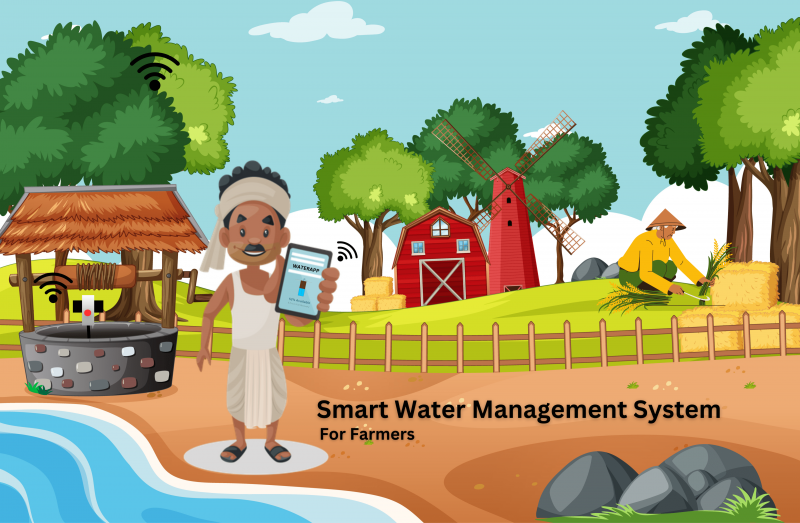Why Should Farmers Adopt Smart Water Management System
Published on by Shibani Thakur, waterapp2021@gmail.com in Technology
An efficient technique for encouraging water conservation in urban landscapes and farmland is using smart irrigation systems. These technologies, which concentrate on everything from plant water requirements to soil moisture levels, assist municipal planners and farmers in identifying possibilities to save water and cut expenses. These technologies can discover regions for development, resulting in significant water savings and more environmentally friendly urban and agricultural practices. With the exponential rise of the human population, the necessity for water resource conservation is becoming increasingly important. Many water management methods have been presented, each with a high cost and energy usage to handle the issue.
The pursuit of an intelligent water management system is gaining traction with the introduction of the Internet of Things (IoT) among farmers for smartly managing the water system. Water Level Sensor for Well , which works on water technology, can make well water visible to the farmers. Digital meters and water level sensors for wells, supervisory control and data acquisition (SCADA) systems, and geographic information systems (GIS) are examples of high-tech water sector solutions rapidly adopted by farmers for smart water management systems.

Objectives of Smart water management system for farmers
The basic goal of a smart water management system based on water technology is to use and recycle water resources fairly and sustainably to be used by farmers for irrigation. Water is becoming an even more valuable asset due to rising population, environmental concerns, and strain on the food and agriculture sectors.
In this regard, water management technologies and activities aim to achieve the following goals:
Reduce water waste in agriculture during irrigation. It entails implementing high-tech practices such as precision farming, smart irrigation, crop water management, real-time water metering, and other Internet of Things applications in agriculture.
Improve water quality by preventing contamination from chemical waste and natural pollution like acidification. Farmers use sensors and IoT technologies for real-time monitoring and control to improve and maintain water quality for agricultural purposes.
Improve the efficiency of water systems such as water collectors, treatment plants, distribution mains, and wastewater recycling facilities. Farmers frequently use IoT and data solutions for asset management and retain vital measures such as water pressure, temperature, water flow, etc.
Water Management System incorporates predictive maintenance and reduces equipment damage and downtime, helping save time and money for the farmers.
Smart farming for improving agricultural management
Food scarcity and population increase are the two most significant problems to global sustainable development. Artificial intelligence (AI), the Internet of Things (IoT), water technology, and mobile internet are examples of advanced technology that can bring practical solutions to the world's concerns. As a result, this work focuses on new smart farming methods, illustrating data collection, transmission, storage, analysis, and acceptable solutions. IoT is critical to smart farming systems since it links sensor devices to execute many basic agricultural activities. The smart irrigation system integrated sensors for monitoring water level, irrigation efficiency, climate, and other variables. Smart irrigation relies on intelligent controllers, sensors, and mathematical relationships.
Furthermore, this work demonstrated the use of unmanned aerial vehicles (UAVs) and robots in real-time harvesting, seedling, weed detection, irrigation, spraying of agricultural pests, livestock applications, and so on, using IoT, artificial intelligence (AI), deep learning (DL), machine learning (ML), and wireless communications.
Even though smart farming applications in developing nations face numerous problems, it is way more effective for farmers in saving water, time management, and money. Furthermore, installing Smart Decision Support Systems (SDSS) in developing nations facilitates real-time analysis, mapping of soil characteristics, and proper decision-making. Finally, smart agriculture in developing nations requires more government and private sector support at the small farm level for effective use of it for farmers at all levels.
Taxonomy
- Water Monitoring
- Water Management
1 Comment
-
An excellent intervention to enhance crop yields